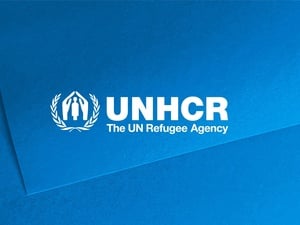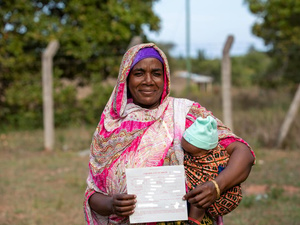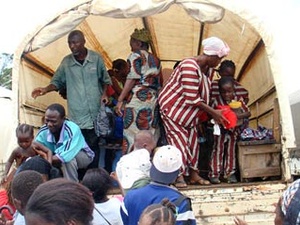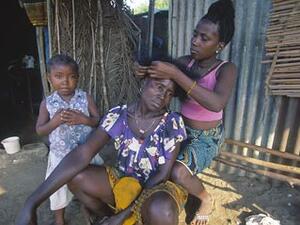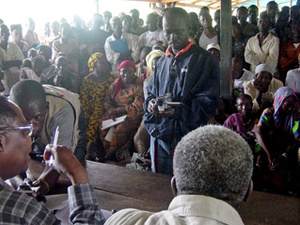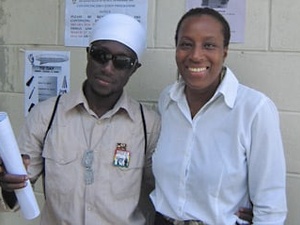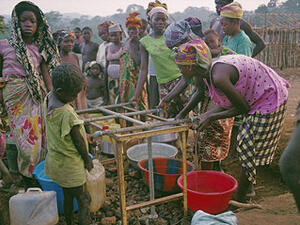UNHCR joins fight against Lassa fever in Sierra Leonean camps
UNHCR joins fight against Lassa fever in Sierra Leonean camps

A refugee child undergoing a check–up in Jimmi Bagbo camp, Bo district, Sierra Leone.
FREETOWN, Sierra Leone, April 1 (UNHCR) - The UN refugee agency has signed an agreement with the government of Sierra Leone and various non-governmental organisations (NGOs) to combat the deadly Lassa fever that has so far infected 80 people in the country's refugee camps and nearby host communities.
Last week, UNHCR's senior regional health coordinator, Marie Claude Bottineau, joined Sierra Leone's health authorities and representatives from the World Health Organisation (WHO), UN Children's Fund (UNICEF), World Food Programme (WFP) and British NGO MERLIN in signing the agreement to control the spread of Lassa fever in southern and eastern Sierra Leone's refugee camps.
Since February, more than 2,000 suspected cases of Lassa fever have been reported in refugee camps located in Bo and Kenema districts. The patients' age ranges from two to 44 years, with children and pregnant women most vulnerable to the disease.
Lassa fever is transmitted through rats, whether through direct contact or through contaminated food. The poor storage of food in some refugee camps draws rats and helps to spread the disease. The situation is exacerbated by the crowded environment within camps. Even after patients have been treated, the virus remains in their bodies for six weeks, during which it can be transmitted through unprotected sex, sharing food and sanitation facilities.
The disease also seems to be seasonal. Over the last four years, it has been noticed that cases of Lassa fever increase during the dry season, when the virus can survive longer in the environment. Generally, in December and January, houses tend to be full of food that is not properly stored. And in February, with the preparation of farming activities - which includes brushing and burning of land - rats stay away from the bush and enter the camps.
All of the camp-based refugees in Sierra Leone are from Liberia, where Lassa fever is prevalent. Over the years, the Liberian refugees may have developed some immunity to the disease, but the local community, which has never been affected, is more vulnerable to it.
Confusion, fear and stigma often add to the severity of the situation. Some refugees may be reluctant to report their sickness to the camp's health authorities, and cases that are not detected and treated in time could spread quickly and easily.
Given Lassa fever's high fatality rate, its speed of infection and the high cost of treatment, urgent action is needed to fight the disease.
Under the inter-agency agreement, Sierra Leone's Ministry of Health will increase medical stocks for treatment, centralise information and work with the US-based Centre for Disease Control, which will handle laboratory implementation, staff training, disease prevention and control.
Currently, there is only one dedicated centre for the treatment of Lassa fever in Sierra Leone - the Lassa ward at the Kenema Governmental Hospital. Additional staff will need to be trained, while adequate equipment and supply stock must be provided.
The referral system from the refugee camps in Bo and Kenema districts to the Kenema Hospital has to be improved. Suspected cases of Lassa fever should be transported in special vehicles, with proper quarantine and qualified staff.
The agreement stipulates that WHO will undertake all medical activities related to the Lassa ward, including drugs, supplies and rodent control. UNHCR will oversee transportation, logistics, communication, advocacy and overall co-ordination.
In the refugee camps, WFP and other camp management agencies will ensure improved food storage and higher hygiene standards. UNICEF will work on improving water and sanitation, while MERLIN will implement training, prevention and control activities in and around the camps. The latter will also be in charge of case management in the Lassa ward.
Already, the affected camps have started educational training on Lassa fever for both refugees and staff. Intensified training sessions could help improve the sanitation conditions, food storage and most importantly, to change attitudes in the camps.


